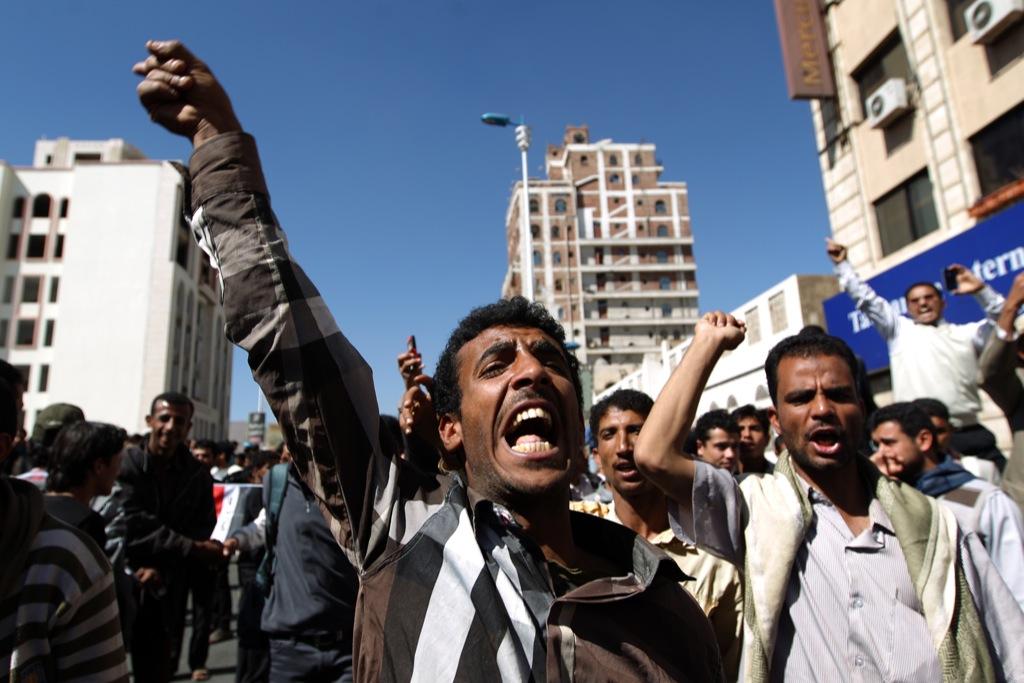How Yemen’s dictator got away
A pro-democracy protester shouts slogans during a demonstration demanding the scrapping of immunity given ex-president Ali Abdullah Saleh under a UN-backed deal, as a Security Council team paid a rare visit to Yemen’s capital Sanaa on Jan. 27, 2013.
Yemenis accuse their former long-time leader, Ali Abdullah Saleh, of countless abuses during the crackdown on the country’s Arab Spring-style uprising in 2011.
An official investigation focused in particular on the deaths of 52 protesters on March 18, 2011, when Yemeni security forces opened fire on a crowd pinned in a central square in Sanaa, Yemen’s capital city. Many activists believe Saleh ordered that attack.
But, in the end, Saleh managed to gracefully leave office, exchanging his position for immunity in a deal brokered by Saudi Arabia and the United States, two of the president’s stalwart allies.
A report by Human Rights Watch released Tuesday, however, says the initial investigation into the killings was incomplete and likely corrupt.
Human Rights Watch said that, at the behest of Saleh, investigators never questioned high-ranking government officials during their criminal investigation. The rights group also found that as soon as the investigation was launched, Saleh dismissed his attorney general, who had broken ranks and called for the questioning of government officials.
Known as the Juma’at al-Karama (Friday of Dignity) massacre, March 18, 2011 marked a turning point in Yemen’s popular uprising and sparked a series of defections by top ranking government and military officials.
As part of a Gulf Cooperation Council power transfer agreement, Saleh was granted immunity after stepping down as president in November of 2011.
“Nearly two years after the Friday of Dignity massacre, the victims and their families await justice,” said Letta Tayler, senior researcher at Human Rights Watch and author of the report.
“If Yemen doesn’t fairly investigate and prosecute those responsible for this deadly attack, it risks perpetuating the culture of impunity at the heart of Yemen’s uprising.”
Nearly two years after the attack, clashes among protesters, political factions and security forces still often erupt across the country. Protesters are adamant that, despite the departure of Saleh, the grievances they expressed during the revolution have not been addressed.
Saleh, in fact, continues to wield considerable power in Yemeni politics — a grim reminder of the failed goals of the uprising.
“The problem I see, is that this report — along with the clashes today — will once again remind people in Yemen that there has yet to be an accounting for the deaths that took place during the uprising,” said Gregory Johnsen, an expert on Yemen at Princeton University. Johnsen is the author of “The Last Refuge: Yemen, al-Qaeda and America’s War in Arabia.”
“And, of course, the immunity deal and Saleh's continued presence on the political scene is a daily reminder of that,” he added.
Yemeni protesters, many of whom remain camped out in Sanaa’s “Change Square,” want Saleh to stand trial for what they say are crimes against humanity. Activists also regularly demonstrate in other cities across the country, most notably in the southern port city of Aden, where two were killed and dozens were wounded in clashes between separatist protesters and Islamists on Tuesday.
"Today's deadly clashes in the south are a grim reminder of the many grievances voiced during Yemen's uprising that have yet to be addressed,” Taylor said. “Unless the transition government holds all those accountable for deadly attacks past and present, whether in Sanaa, Aden or elsewhere in the country, there will be no break with the abuses of the past in Yemen.”
Every day, reporters and producers at The World are hard at work bringing you human-centered news from across the globe. But we can’t do it without you. We need your support to ensure we can continue this work for another year.
Make a gift today, and you’ll help us unlock a matching gift of $67,000!
